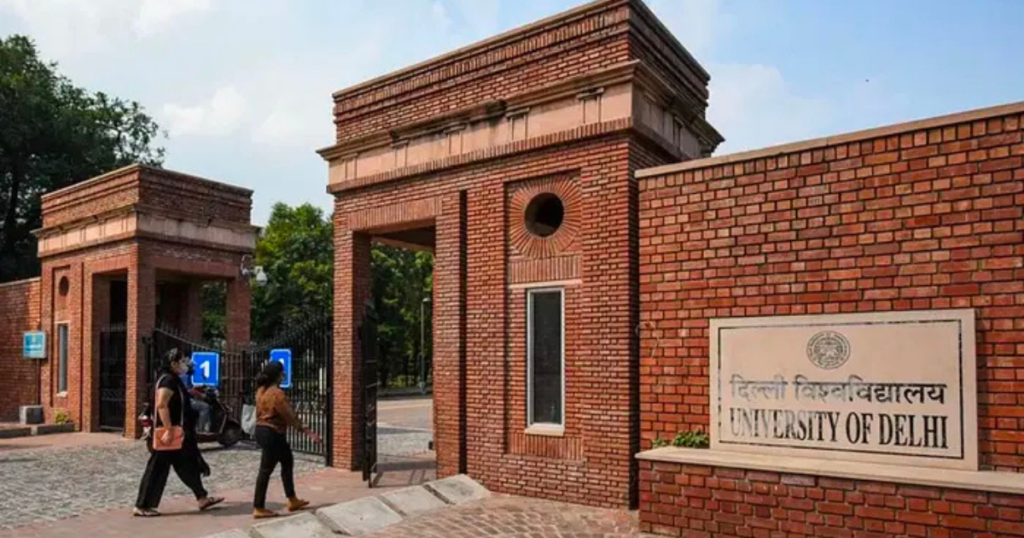Delhi University (DU) faces backlash over 12-hour class schedule under NEP 2020. Students, teachers raise concerns about feasibility, mental health & faculty shortage.

“How can students sit in classrooms from 8 in the morning to 8 at night?” This is the burning question on everyone’s mind at Delhi University, as the prestigious institution rolled out the fourth year of undergraduate studies under the National Education Policy (NEP) 2020. Beginning August 1, 2025, DU colleges have been directed to function for 12 hours daily—an announcement that has triggered protests, confusion, and anxiety across campuses.
What caught most students and faculty off guard was not just the intensity of the decision but its timing. The notification was released late on July 31, mere hours before the start of the new academic session. Instead of ushering in excitement about the new academic year, the news has been met with apprehension. Faculty members and students alike are questioning the feasibility of such a demanding schedule, calling it impractical, exhausting, and disconnected from ground realities.
According to the notification, colleges are advised to keep their doors open from 8 a.m. to 8 p.m. in order to ensure “optimal utilisation of resources.” The idea, officials suggest, is to accommodate the expanded academic load brought in by the NEP framework and to make better use of faculty deployment. On paper, it might seem like a way to manage growing demands. But in practice, many educators say it risks pushing students and staff beyond their limits.
“Are we turning our colleges into factories?” asked a professor from one of DU’s North Campus colleges. “Students are not machines who can sit in classrooms for 12 hours straight. They have to travel long distances, participate in extracurricular activities, prepare for competitive exams, and most importantly, take care of their mental health. This decision completely ignores the holistic development NEP itself promises.”
The issue of mental health has been repeatedly raised by both students and teachers. In an era when universities worldwide are working to reduce stress and promote well-being, a 12-hour academic day seems to go in the opposite direction. Students already spend significant time commuting in Delhi’s traffic, often traveling two to three hours daily. Adding an extended college day leaves little space for rest, family interactions, or part-time work—activities that are essential for overall growth.
The mandate also sparks practical concerns about faculty availability. The university’s Executive Council has suggested staggered deployment of teachers and the engagement of guest faculty to cover the extended schedule. However, many teachers fear this may dilute the quality of teaching. “Guest faculty cannot be a long-term solution,” argued another faculty member. “Education is about consistency and mentorship. Relying too heavily on ad hoc arrangements undermines that.”
The notification further cites Clause 15 of the UGC Regulation 2018, which prescribes that assistant professors must deliver 16 hours of direct teaching per week, while associate professors and professors must clock in 14 hours. While the regulation outlines teaching hours, critics point out that it was never meant to justify a 12-hour institutional workday.
Adding to the discontent is the exclusion of ad hoc teachers from teaching the new fourth-year courses. For a university where ad hoc staff form a significant part of the teaching workforce, this has sparked worries of job insecurity and increased burden on permanent faculty.
The larger concern, however, remains whether this rigid timetable aligns with the vision of the NEP. The policy, in its spirit, emphasises flexibility, interdisciplinary learning, and student choice. A 12-hour institutional timetable seems at odds with this philosophy, threatening to turn classrooms into rigid spaces rather than hubs of creativity and learning.
Students, meanwhile, have taken to social media to voice their frustration. Posts with hashtags like #DU12Hours and #StudentsNotMachines are gaining traction, with many calling for a review of the decision. Several student unions are also planning protests in the coming weeks, demanding that the administration revisit the notification.
As Delhi University navigates this controversy, one thing is clear: the debate is not just about hours, but about the kind of education system India wants to build. Should colleges prioritise resource utilisation at the cost of student well-being? Or should they design structures that genuinely support holistic growth, as promised under NEP 2020?
For now, the 12-hour class schedule remains in place, but the growing backlash suggests the university may have to reconsider. Whether the administration listens to its students and teachers—or continues with its experiment—will decide the future of this contentious reform.
Also Read: IGNOU July 2025 fresh admission registration deadline extended
AI at IIT Kanpur: Drones, Mental Health Tools, and the Ethics of Classroom Use